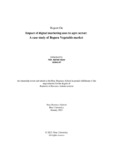| dc.contributor.advisor | Ahmed, Md. Shamim | |
| dc.contributor.author | Islam, MD. Rafiul | |
| dc.date.accessioned | 2024-01-28T06:55:37Z | |
| dc.date.available | 2024-01-28T06:55:37Z | |
| dc.date.copyright | 2023 | |
| dc.date.issued | 2023-01 | |
| dc.identifier.other | ID 18304107 | |
| dc.identifier.uri | http://hdl.handle.net/10361/22221 | |
| dc.description | This internship report is submitted in partial fulfillment of the requirements for the degree of Bachelor of Business Administration, 2023. | en_US |
| dc.description | Cataloged from PDF version of internship report. | |
| dc.description | Includes bibliographical references (page 24). | |
| dc.description.abstract | The government of Bangladesh has consistently prioritized providing food security for its citizens. Unpredictable swings in the price of vegetables are a common issue that affects both farmers and merchants. To address this, digital communication technologies, such as the internet and mobile phones, are increasingly being adopted in the country. This can be used to enhance the stability and efficiency of the vegetable market.
The use of digital communication technologies such as mobile phones is increasingly widespread amongst farmers, even those with lower incomes and lower levels of education. Research has shown that those who have completed at least high school level education and make more than 2 lakh takas a year are more likely to use such technologies for marketing their produce, potentially increasing efficiency and productivity. As mobile phones have become more accessible, many farmers and their families have at least one device, which can be used by all family members.
Farmers should be encouraged to utilize digital communication systems in order to bolster the production and sale of vegetables and other agricultural products. By utilizing such systems, farmers can gain access to data that can help them determine the best vegetables to grow throughout the year, reduce production and marketing costs, and even secure better prices for their produce.
The government should take initiative in setting up a telephone-based advisory service to provide guidance on the use of pesticides on vegetables. Currently, farmers obtain pesticide advice from sales representatives of different insecticide companies, which is often biased towards the products they market. Due to the remote locations of most vegetable farmers, they are unable to access the assistance offered by agricultural extension departments. This telephone advisory service would be especially valuable to vegetable growers, offering advice on topics such as variety selection, planting techniques, fertilizer usage, preservation and shipping techniques. It should also extend beyond insecticide use, providing a range of advice. | en_US |
| dc.description.statementofresponsibility | MD. Rafiul Islam | |
| dc.format.extent | 24 pages | |
| dc.format.extent | 24 pages | |
| dc.language.iso | en | en_US |
| dc.publisher | Brac University | en_US |
| dc.rights | Brac University internship reports are protected by copyright. They may be viewed from this source for any purpose, but reproduction or distribution in any format is prohibited without written permission. | |
| dc.subject | Digital marketing | en_US |
| dc.subject | Agro sector | en_US |
| dc.subject | Vegetable market | en_US |
| dc.subject | Likert scale | en_US |
| dc.subject.lcsh | Online marketing | |
| dc.title | Impact of digital marketing uses in agro sector: a case study of Bogura Vegetable market | en_US |
| dc.type | Internship report | en_US |
| dc.contributor.department | Brac Business School, Brac University | |
| dc.description.degree | B. Business Administration | |

